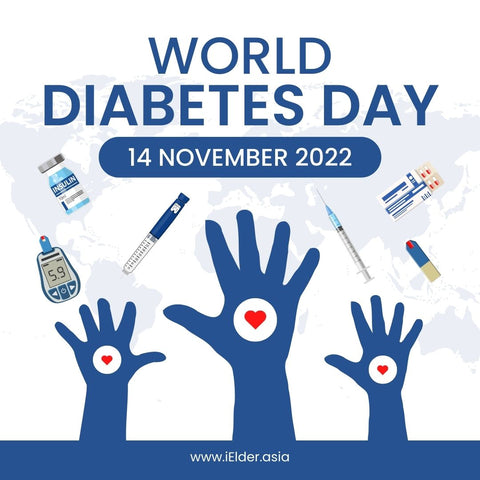艾琳·王(Irene Wong)七十出头时住在吉隆坡,被诊断出患有2型糖尿病。起初,她感到震惊和恐惧,医生抛给她的各种信息让她不知所措。她每天至少要测四次血糖,服用二甲双胍,还要用胰岛素笔注射胰岛素。她决定寻找糖尿病专科医生,并学习如何在患有1型糖尿病的情况下照顾自己。经过一番努力,她最终学会了如何应对自己的病情。艾琳建议适度运动并减少碳水化合物的摄入:“我的意思是,如果你特别想吃苹果派,那就吃吧,”艾琳说,“但千万别再配上一盘薯条和一大杯汽水。”

2006年,联合国通过决议,将11月14日定为世界糖尿病日,旨在提高公众对糖尿病的认识,包括糖尿病的预防、并发症以及对糖尿病患者的护理。糖尿病是导致失明、截肢、心脏病和肾衰竭的主要原因之一,也是全球主要死因之一。
2021年世界糖尿病日的主题是“获得糖尿病护理” 。全球数百万糖尿病患者无法获得所需的糖尿病护理。糖尿病患者需要持续的护理和支持来控制病情并预防并发症,因此,世界各国政府应采取行动,确保所有需要的糖尿病患者都能获得药物、技术、支持和护理。
糖尿病是一种隐匿性疾病,它会悄然发生,但定期检测可以帮助您监测自身状况。简而言之,糖尿病饮食的目标是控制血糖水平。防止血糖飙升有助于控制体内胰岛素的分泌。此外,该饮食方案还旨在促进体重减轻,因为这对于糖尿病患者的健康至关重要,尤其对于行动不便的老年人而言。
照顾患有糖尿病的老年人包括
- 记录用药情况——检查剂量是否正确
- 确保规律进餐——不要漏餐
- 密切监测血糖——如果血糖过低,应立即饮用含糖饮料,或加入一汤匙蜂蜜或果酱。
- 定期就医。
以下是一些帮助糖尿病患者管理饮食的简单步骤,尤其适用于您的老年亲人。
尤其是在碳水化合物方面。这并不意味着糖尿病患者需要完全避免碳水化合物。关键在于碳水化合物的
种类。不要食用加工过的精制碳水化合物,例如甜食和甜点。而应选择水果、豆类和蔬菜。这些被称为
复合碳水化合物,消化速度较慢,不会导致血糖飙升。这对于老年糖尿病患者的血糖控制至关重要。
规律进餐有助于调节血糖水平。进餐时间与食物本身同样重要。为了避免血糖波动,应每天定时进餐。建议老年人每隔4-5小时进食一次,以预防低血糖。照护者应协助糖尿病患者按时进餐,并按需服用药物。
最重要的原则是:甜食、甜点、软饮料、蜂蜜和其他甜食绝对禁止。您可以偶尔少量享用。为了更好地控制老年人的糖尿病,应通过新鲜或冷冻水果来缓解对糖的渴望。果汁含糖量高,因此应从饮食中剔除。低脂食品,例如酸奶和其他乳制品,也应避免食用,因为它们通常会添加糖来弥补脂肪含量的降低。
膳食纤维是糖尿病患者健康饮食的重要组成部分。膳食纤维对身体有很多益处。老年糖尿病患者应该多吃富含膳食纤维的食物,例如水果、蔬菜和坚果。
最好是自己做饭。高度加工食品通常含有过量的钠、糖和不健康的饱和脂肪。自己准备饭菜或请护理人员帮忙准备是避免摄入不必要盐和糖的好方法。
糖尿病患者患心脏病的风险比非糖尿病患者更高。过量的钠会导致许多并发症,包括高血压、心力衰竭和中风。
关键在于用其他食物替代,而不是去除,让糖尿病饮食更加轻松愉快。不要让糖尿病成为你生活中不速之客。
除了健康饮食之外,以下几点建议也很重要。
保持活跃
鼓励您的亲人多走动,在房子里走动。或者,在椅子脚下安装健身踏板,或放置一辆固定式健身自行车。
减肥
通过运动和健康饮食,争取减掉5%-10%的体重。
请勿吸烟
吸烟会增加并发症的风险。
设定小目标,共同做出改变
如果你的父母患有糖尿病,他需要特别注意皮肤护理、口腔卫生和足部护理(每天检查是否有疮、水疱、感染和厚茧)。
3个实用资源
https://diabetesmalaysia.org.my
马来西亚糖尿病协会(DM),前身为马来西亚糖尿病协会,是一个成立于 1981 年、于 1983 年注册的非营利性非政府组织,旨在帮助糖尿病患者过上健康而富有成效的生活。
https://nadidiabetes.com.my/
国家糖尿病研究所(NADI)的成立旨在为糖尿病患者提供专业全面的服务,以预防和控制糖尿病及其并发症。NADI是一个非营利组织,由理事会管理,理事会成员包括马来西亚内分泌与代谢学会(MEMS)、马来西亚糖尿病协会(DM)、卫生部(MOH)的代表以及选举产生的创始成员。
https://mdes.org.my
马来西亚糖尿病教育者协会是马来西亚领先的医疗保健专业人员组织之一,致力于提供糖尿病教育和管理服务。MDES旨在通过教育和公众宣传,提高糖尿病患者及高危人群的自我管理能力,从而改善他们的生活质量。
推荐给糖尿病患者的实用产品
![[7 February 2026] Afternoon Tea Session for Stronger Steps](http://ielder.asia/cdn/shop/articles/stronger_steps_seminar_586x586_crop_center.png?v=1769583572)












发表评论